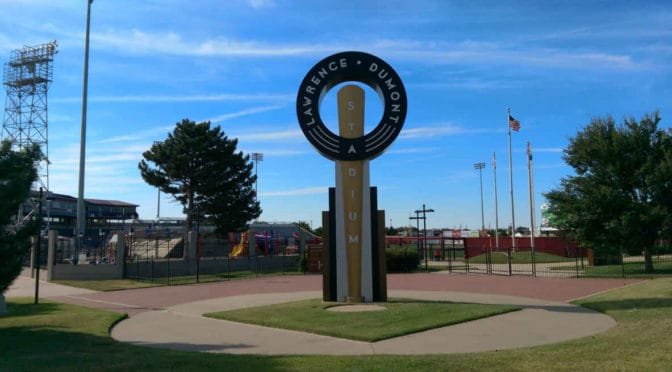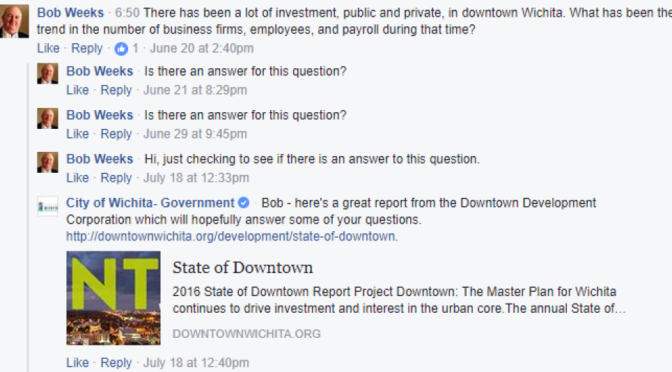More, but likely not all, of the Cargill incentives will be before the Wichita City Council this week.
A division of Cargill, Cargill Meat Solutions Corporation, is moving from an office on North Main Street in downtown Wichita to the site of the former Wichita Eagle building, also in downtown Wichita. Last year it was widely reported that Cargill was considering moving this division to another city. Reports of incentives offers to Cargill from other cities spurred the City of Wichita to offer its own incentives if Cargill would remain in Wichita. This week the city council will consider additional subsidies and incentives besides those already offered.
As summarized in the agenda packet:
“In exchange for Cargill’s commitment, the City has negotiated the following:
- Issue Industrial Revenue Bonds (Letter of Intent approved April 18, 2017) 100% property tax abatement; 5+5 year basis
- Sales tax exemption
- Acquisition of a 15 year parking easement for public access to the garage in the evenings and on weekends (estimated cost of $6,500,000)
- Expedited plan review (50% reduction in time)
- Reduced permitting fees (50%) (estimated savings of $85,000)
- Assign a project manager/ombudsman for a single point of contact for the company”
Industrial Revenue Bonds
In April the city council approved a letter of intent regarding Cargill’s participation in the Industrial Revenue Bond program. The city won’t be lending Cargill money. Instead, IRBs are a (convoluted) method whereby local governments are able to forgive the payment of property taxes. For the case of Cargill, city documents from April state the tax forgiveness could be worth $1,359,531 per year. This would be shared by these taxing jurisdictions in these annual amounts, again according to city documents:
- City of Wichita: $378,450
- Sedgwick County: $340,958
- USD 259, the Wichita Public School District: $622,723
- State of Kansas $17,400
The property tax savings will probably be greater, if Cargill spends as much as it has agreed to spend and the appraiser values the building accordingly. Rough calculations indicate tax savings as much as $1,755,000 per year.
Cargill has agreed to make an annual Payment-In-Lieu-Of-Taxes (PILOT) of $413,900, according to city documents.
In addition to the property tax exemption, the IRBs also carry a sales tax exemption for purchases related to construction. City documents give an estimated value of $2,026,291 for the sales tax Cargill will not have to pay.
Parking easement
At one time, it was thought that the city would build a parking garage and let Cargill use it an no cost, or at a greatly reduced cost. Instead, the city now proposes that Cargill build the garage and the city will acquire an easement. This has sounded almost benign, but now we realize that the city will pay Cargill an estimated $6.5 million. In return, the city will be able to use up to approximately 700 parking spaces outside of Cargill business hours.
Is this a good deal for the city? The city has agreed to pay $9,286 for the use of each parking space. For comparison, recently the city rehabilitated the parking garage at 215 S. Market at a cost of $17,609 per parking space. The city rents 180 of these to a nearby company at the rate of $35 per month, which is $420 per year.
To repeat: The city has agreed to pay Cargill $9,286 for something it charges others $420 per year.
It is not known whether the city will charge fees to the public to use the garage. It is also unknown whether there is much demand for public parking at the Cargill location, but present market conditions would suggest there is not much additional demand.
Expedited plan review, reduced fees, and ombudsman
The city has agreed to cut permit fees and speed response time for approvals.
This incentive — the need for it and its value to Cargill — is an explicit admission that City of Wichita regulations are burdensome. If not, why would the city devote time and expense to helping Cargill obtain relief from these regulations?
Consider this aspect of public policy: Cargill is a large company with — presumably — fleets of bureaucrats and lawyers trained to deal with burdensome government regulation. These costs can be spread across a large company, meaning that Cargill can afford to overcome burdensome regulations.
But what about the small companies that don’t have fleets of bureaucrats and lawyers? Small companies that can’t spread the costs of regulation across a large volume of business? What will the city do for these companies? This is especially important because the spirit of entrepreneurship the city wants to cultivate is most commonly found in small, young, companies — the type of company without fleets of bureaucrats and lawyers.
The city says it would do for any company what it is doing for Cargill. Except: How are companies supposed to know to ask for regulatory relief, streamlining, and a discount on fees?
If the city really wants to help all companies, it would — at its own initiative — cut fees and reduce response time across the board, for everyone. Until then Wichita offers special regulatory treatment for special circumstances, which widens the gulf between the haves and have-nots.
Other subsidy programs
The agenda packet for the city council meeting doesn’t mention this, but from the state of Kansas Cargill is likely to receive PEAK benefits. Under this program, the Kansas state withholding tax deducted from Cargill employees’ paychecks will be routed back to Cargill. (Not all; only 95 percent.) Some very rough calculations show that PEAK benefits might be worth some $2 million annually to Cargill.
Ironically, with the recent increases in Kansas income taxes, PEAK is even more valuable to Cargill.
Is this needed?
In the past, economic development subsidies of this type were justified by local governments as necessary to recruit new companies to the area. These subsidies, however, are used simply to retain a company that is already located in downtown Wichita.
The city has asked Wichita State University’s Center for Economic Development and Business Research to produce benefit/cost ratios. They show that the costs the city, county, and state incur will generate benefits that exceed these costs. For the school district, costs exactly equal benefits — a remarkable coincidence.
The reasoning and calculation behind these benefit/cost ratios is opaque. The general idea is that spending by a company spawns other spending that results in economic benefit and growth. That’s true. It’s important to know, however, that this benefit also occurs when companies move to Wichita or expand in Wichita, without the benefit of economic development subsidies.
The question, then, becomes are these incentives necessary? Would Cargill have moved to another city if not for these incentives? It’s only if Cargill would have left Wichita that the benefit/cost ratios have any meaning.
The City of Wichita says Cargill received lucrative offers from other cities. But these offers have not been seen, to my knowledge. We’re left to take the word of Cargill that it received offers from other cities, and that it would have moved from Wichita if not for Wichita’s incentives.
Cargill, as we’ve seen, has a multi-million dollar motive. City of Wichita officials also have a large motive, as do officials and politicians at the state level. The politicians and bureaucrats want to — need to — be seen as doing something to improve the economy. It costs none of them one dime to pay these incentives. But the Cargill building will fulfill their ediface complex when they preside at groundbreaking and ribbon-cutting ceremonies.
If Wichita leaders wanted to gain the trust of Wichitans, to have us believe and understand that these incentives are necessary to keep Cargill in Wichita, the city could reveal the other offers Cargill received. Cargill itself could reveal offers it received from other cities. These actions would help Wichitans understand whether these incentives are truly needed. But the world of economic development incentives is a murky swamp.
Finally, Mayor Jeff Longwell, other council members, and city hall bureaucrats tell us that the city has moved beyond cash incentives. Cash will not be paid for jobs, they say.
But forgiving a tax bill is just like paying cash. Discounting the cost of permits is just like paying cash. Paying $6.5 million to use a company’s parking garage during hours the company has no use for it: How is that different from simply paying the company a cash incentive?
Perhaps the mayor and others have a different understanding of the economics of transactions than I.
—
Notes















 But that’s not all. Since the implementation of the “City Tourism Fee” Visit Wichita collects 2.75 percent of hotel bills. (Welcome to Wichita! Here’s the bill for your tourism fee!) That’s estimated to generate $3 million in 2017.
But that’s not all. Since the implementation of the “City Tourism Fee” Visit Wichita collects 2.75 percent of hotel bills. (Welcome to Wichita! Here’s the bill for your tourism fee!) That’s estimated to generate $3 million in 2017. The lack of transparency at Visit Wichita is more problematic than this. Visit Wichita refused to provide to me its contract with a California firm retained to help with the re-branding of Wichita. When the Wichita Eagle later asked for the contract, it too was refused. If the city had entered into such a contract, it would be a public record. Contracts like this are published each week in the agenda packet for city council meetings. But Visit Wichita feels it does not have to comply with simple transparency principles.
The lack of transparency at Visit Wichita is more problematic than this. Visit Wichita refused to provide to me its contract with a California firm retained to help with the re-branding of Wichita. When the Wichita Eagle later asked for the contract, it too was refused. If the city had entered into such a contract, it would be a public record. Contracts like this are published each week in the agenda packet for city council meetings. But Visit Wichita feels it does not have to comply with simple transparency principles.